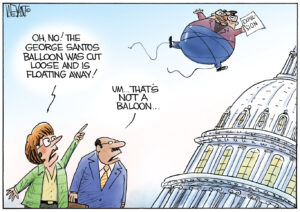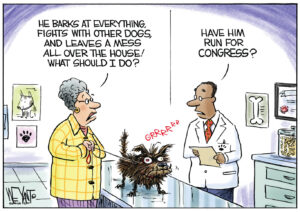Stop Logging Our Phone Calls
Once in a great while, House Republicans get it right. Frédéric BISSON (CC BY 2.0)
Frédéric BISSON (CC BY 2.0)
WASHINGTON — Once in a great while, House Republicans get it right. So let me praise them for leading a bipartisan effort to curtail the National Security Agency’s bulk collection of data on the phone calls of innocent Americans.
The USA Freedom Act, which the House passed earlier this month by an overwhelming 338-88 vote, would end the NSA’s vast effort to compile phone call “metadata.” We only learned that the government was keeping a comprehensive record of our calls when fugitive whistleblower Edward Snowden spilled the beans; our elected officials, including President Obama, hadn’t bothered to tell us.
I agree with Sen. Rand Paul, R-Ky., that the bill passed by the House doesn’t go far enough to restore our privacy. But it is light-years better than what Senate Majority Leader Mitch McConnell, R-Ky., wants, which is to allow the blanket surveillance to continue pretty much as is.
This is an issue on which progressives and libertarian-minded conservatives find common ground — and shared passion. Following the 9/11 attacks, our elected officials exchanged a measure of our liberty for the promise, or the illusion, of greater security. It was a hasty and foolish bargain.
We ended up with a system that would have strained even Kafka’s imagination. The NSA was allowed to compel telecommunications companies to turn over complete records of their customers’ phone calls. This permission was granted by the Foreign Intelligence Surveillance Court, which reinterpreted Section 215 of the Patriot Act — which speaks of requiring firms to surrender business records — to encompass the seizing of domestic phone records. Basically, all of them.
We were not allowed to know the law had been stretched in this manner, however, because the foreign intelligence court meets in secret, with only the government’s lawyers present, and issues secret orders based on secret interpretations of the law.
It is simply not possible to have a society based on the rule of law if citizens are not allowed to know what the law means. Even members of Congress who had leading roles in writing the Patriot Act did not know that the law was being used in this manner — nor did they intend it to be. Yet that was where things stood, pre-Snowden, and both the Bush and Obama administrations thought everything was fine.
Following the Snowden revelations, we heard loud protestations from the intelligence community to the effect that the collection of phone metadata was both unthreatening to individual privacy and essential to national security. Neither is true.
The data is collected with no names attached to the phone numbers, but the whole point of the exercise is that law enforcement and intelligence agencies can — and do — find out who belongs to any number singled out for investigation. The government can find out whom you’re calling, how often, how long the calls last, roughly where you’re calling from. Then it can learn the same information about the people you call, and the people they call. With enough such data, it’s possible to discern a lot about any individual that should be none of the government’s business.
Not to worry, say the spooks. But we know the program has been abused. A new report by the Justice Department’s Office of the Inspector General, looking at the use of Section 215 between 2007 and 2009, recounts how even the judges on the secret intelligence court became angry at the NSA’s “misrepresentations” and overreach. The agency was put on a short leash until it promised to behave.
The report said that FBI agents who were interviewed “told us that Section 215 authority continued to be a valuable investigative tool” — but “did not identify any major case developments that resulted from use of the records obtained in response to Section 215 orders.” The phone data was used to “support” and “corroborate” other leads.
Which begs the obvious question: Why didn’t the agents just ask the secret court to subpoena the records of people already under suspicion of terrorist activity?
That’s precisely what the government could and should have done. The problem with the bulk collection of phone data, or any kind of private information, is that it violates what many of us believe is a fundamental principle: A search should be based on suspicion.
Obama has promised to reform the metadata program, but this doesn’t go far enough. It should just be ended. Any other secret reinterpretations of our laws must be brought to light. Kafka needs to be put back on the fiction shelf where he belongs.
Eugene Robinson’s email address is [email protected].
© 2015, Washington Post Writers Group
Your support matters…Independent journalism is under threat and overshadowed by heavily funded mainstream media.
You can help level the playing field. Become a member.
Your tax-deductible contribution keeps us digging beneath the headlines to give you thought-provoking, investigative reporting and analysis that unearths what's really happening- without compromise.
Give today to support our courageous, independent journalists.






You need to be a supporter to comment.
There are currently no responses to this article.
Be the first to respond.